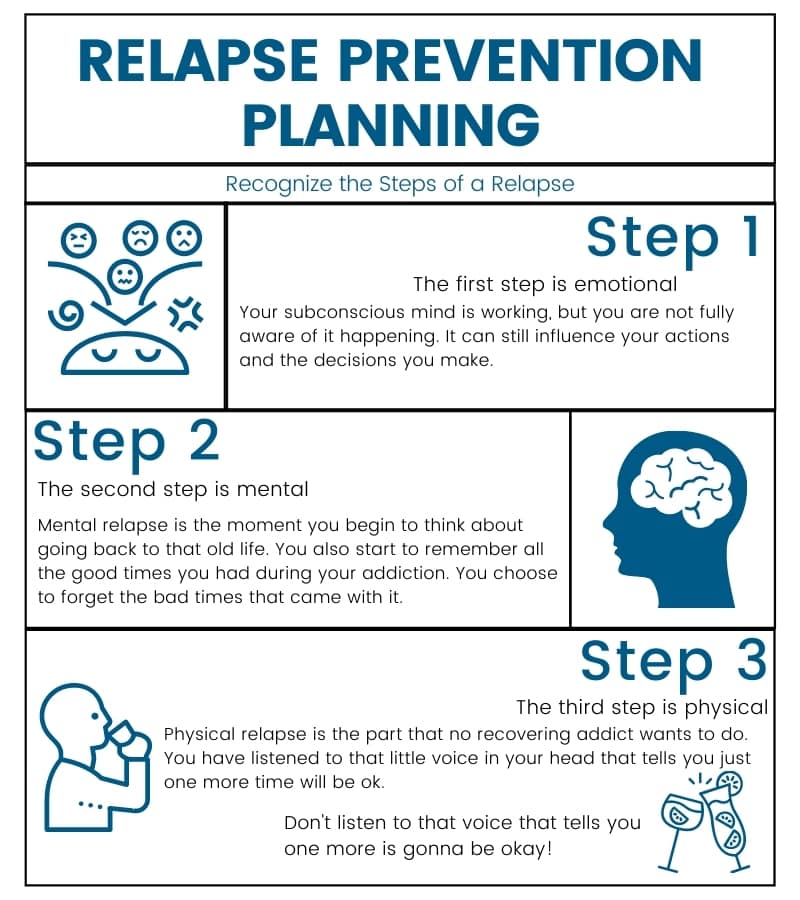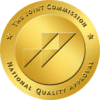5 Key Tips for Creating a Relapse Prevention Plan

Have you, or someone you know, taken that massive step towards quitting an addiction? Are you worried about potential relapse from the hard work achieved?
Did you know 85% of people relapse within a year of treatment?1 Don’t join this number. Make yourself and your loved ones proud by following these tips to avoid relapse.
Addiction is a serious thing. By reading this article means either you or someone you know has taken that brave step into quitting. This article aims to keep people on track. It also aims to prevent them from joining that massive statistic mentioned above.
If you or a loved one suffer from substance addiction, part of recovery is a relapse prevention plan. Learn more here.
What Is Addiction?
Addiction is defined as a compulsive, chronic, physiological or psychological need for a habit-forming substance, behavior, or activity…’. This habit can be drugs, alcohol, gambling, and more.2
The need that comes from this consumption drives people to do some outrageous things. Such things they would not usually consider doing. It can take over people’s lives.
A particular group of brave people takes the step to quit their addiction. This step is not an easy feat. These people may become tempted to relapse back into their old ways. By relapsing, they are destroying all the progress they have made. Remember that relapsing can be prevented from happening.
Recognize the Steps of a Relapse
Relapsing has been determined to follow three steps. These steps can happen without you even realizing they are. They don’t all happen in one day, either. They can take months to go from one to the other.
Focus and don’t let them fall under the radar. Noticing these steps is a massive factor in how to prevent relapse from happening.
The first step is emotional.
- Emotional relapse is the subconscious side of things. Your subconscious mind is the part of your mind which is working, but you are not fully aware of it happening.3
- Although you are unaware, it can still influence your actions and the decisions you make. You may begin to seclude yourself from those around you or find yourself growing anxious. You become defensive, refusing to ask for help. Your mood tends to swing constantly.
The second step is mental.
- Mental relapse is the moment you begin to think about going back to that old life. You fight with yourself about doing it or not. Part of you still wants to stay on this path you have chosen.
- You also start to remember all the good times you had during your addiction. You choose to forget the bad times that came with it. You fantasize about potentially having a one-off experience with your old habit.
The third step is physical.
- Physical relapse is the part that no recovering addict wants to do. You have listened to that little voice in your head that tells you just one more time will be ok.
- DON'T LISTEN TO IT.
- By having that one drink, or that one hit of cocaine, you will be making all the progress you have made so far pointless. Through the simple act of reading this article shows how much you have achieved already.
Know Your Triggers
When going through significant change, some triggers stop it from happening. They may also revert things to how they were before you made it. These triggers may be hard to notice. Once you have learned them, they can be a sign of how to stop relapse from happening for you.
Triggers vary from person to person. There is no script on how to find them either. Your triggers could be a specific aspect of your life that is depressing you. On the opposite side of things, it could be from a happy position that could get carried away.
Being in a toxic relationship could cause you to relapse due to you being unhappy. If this is the case, maybe it’s time to step away and focus on your mental health.
Do you have a group of friends who go out drinking all the time, doing drugs most nights? These people may attempt to enable you to join them, or simply being around them may tempt you into joining them. Stepping away from these people may be how to resist relapse from happening to you.
Are you finding some aspect of your life extremely stressful? Stress may be your trigger. You relapse to escape the world for the short amount of time taken for your addiction to encase your life. These worries will come back and potentially be worse after you relapse.
Identifying and knowing your own personal triggers can be key in relapse prevention.
Ask Your Friends and Loved Ones for Help
With the recent world changes, mental health has become a priority in most people’s lives. Mental health will be a bigger priority for those going through the changes of quitting an addiction. If your mental health is depleting, then that may cause a relapse.
At no point should you feel like you are not allowed to call upon those non-toxic friends and loved ones. You aren’t a burden for trying to make your life better. If they genuinely aren’t toxic, they will help as and when they can.
Reach out on those days you find a struggle. Be honest with them on days you are tempted to go back to your old ways. Speaking about these feelings and temptations is a great way to resist.
If you don’t wish to speak with your friends and family, attend an addiction treatment program. Professionals run these programs. They will understand what happens when you relapse. They’ll give advice and help set you up with a relapse prevention plan.
Don’t fear reaching out for help. You are not alone on this path. You have many people around who wish you to succeed as much as you do.
Learn Skills to Add to Your Relapse Prevention Plan
We have covered the signs, triggers, reasons, and who you can call on to help you. Now let’s have a look into some tips to avoid relapse you can do yourself.
When you are making your relapse prevention plan, there are many skills you can use to help. Choose the ones which work best for you, or even go out and find your own. One of these skills could be the perfect one for how to stop relapse finding you.
Look After Yourself Physically
When recovering from an addiction, some common withdrawal symptoms are insomnia and fatigue. By adding physical exercise to your daily routine will help counteract these symptoms. Taking better care of yourself with a healthy diet will also help you with your journey.
Think HALT
Sometimes you will find yourself stood on that mental step. Finding temptations are surrounding you. If you do find yourself there, remember to HALT and think.
Are you undergoing these triggers:
- Hungry
- Angry
- Lonely
- Tired
By stopping for a second and thinking over all these triggers, you can quickly amend them. By taking action, you are resisting finding out what happens when you relapse.
Practice Mindfulness Exercises
Focus on your mindfulness. Mindfulness is an excellent resource on how to resist relapse. It is a state of mind where you are fully aware of every aspect of your life at each moment in time4. Concentrate on telling yourself you deserve to be happy, how you deserve to find peace in your life.
Look For Support Groups in Your Area
Join a support group. These groups aren’t just for the worst-case scenarios. They are a valuable resource to meet with each week to talk with about your life. Talking with others that relate and understand can be the biggest asset you add to your relapse prevention plan.
5-4-3-2-1
Are you finding yourself becoming anxious or stressed out? Use techniques to battle this obstacle. Techniques such as the 5-4-3-2-1 technique focus on your mind. They help reduce the tension that builds from such feelings.
When these feelings strike, stop whatever you are doing and focus on the following list.
- Acknowledge 5 things surrounding you that you can see
- Acknowledge 4 things surrounding you that you can touch
- Acknowledge 3 things surrounding you that you can hear
- Acknowledge 2 things surrounding you that you can smell
- Acknowledge 1 thing surrounding you that you can taste
Breathe and Meditate
Everybody breathes. Not everyone knows that changing your breathing pattern can change your brain chemistry. Your mind is equally as important as your body. Controlling your breathing can release neurotransmitters in your brain.
Try mixing breathing control with meditation. Doing so will help you control your mind and bring you into a happier lifestyle.
Keep a List of Those You Can Contact in an Emergency
As I have mentioned a few times already, talking is your best option to prevent a relapse. Finding those people you can talk to may be challenging, but you take note once you find them. Keep a list in an accessible place where you can use it when you see those triggers or temptations building up.
I can’t stress enough how important these people are to your recovery. Also, how willing they will be to help you through your journey. Call them as, and when you start to slip, they will be happy to talk you through it.
A Note to Those Supporting Their Loved Ones
This article had the primary attention aimed at those wishing to know how to prevent a relapse. But it could also be helpful to those supporting these brave people.
Talking with your friends or family battling this addiction is a great way to learn. You can understand what they are going through and even learn their triggers. You can be a part of their relapse prevention plan. If you know their triggers, you can keep an eye out for them and know how to stop a relapse before it starts.
Supporting your loved ones can be stressful. You will see them going through bad times quite often. Remember that they have a far more stressful time than you, and be there if they need you.
Search for more advice on how to help your loved ones, help them in any way you can.
Stay Strong and Believe In Yourself
Now your know a few more tips on how to make your relapse prevention plan. If you stick to your plan, you will stay strong and make it through the temptations.
Find your triggers and avoid them. Concentrate on your life and what’s going on around you. Are you slowly climbing those steps towards a relapse?
Find people you can talk to during every stage of your struggle. Learn new skills on how to prevent relapse from your new life.
Contact us today to enquire about programs we have to offer you or those you care about. Asking for help is not a weakness; it’s a cure.
Sources
[1]Sinha R. (2011). New findings on biological factors predicting addiction relapse vulnerability. Current psychiatry reports, 13(5), 398–405. https://doi.org/10.1007/s11920-011-0224-0
[2] NIDA. 2018, June 6. Understanding Drug Use and Addiction DrugFacts. Retrieved from https://www.drugabuse.gov/publications/drugfacts/understanding-drug-use-addictionon 2021, May 14
[3] Wikipedia contributors. (2021, April 14). Subconscious. In Wikipedia, The Free Encyclopedia. Retrieved 16:41, May 14, 2021, from https://en.wikipedia.org/w/index.php?title=Subconscious&oldid=1017775057
[4] Wielgosz, J., Goldberg, S. B., Kral, T., Dunne, J. D., & Davidson, R. J. (2019). Mindfulness Meditation and Psychopathology. Annual review of clinical psychology, 15, 285–316.
https://doi.org/10.1146/annurev-clinpsy-021815-093423




